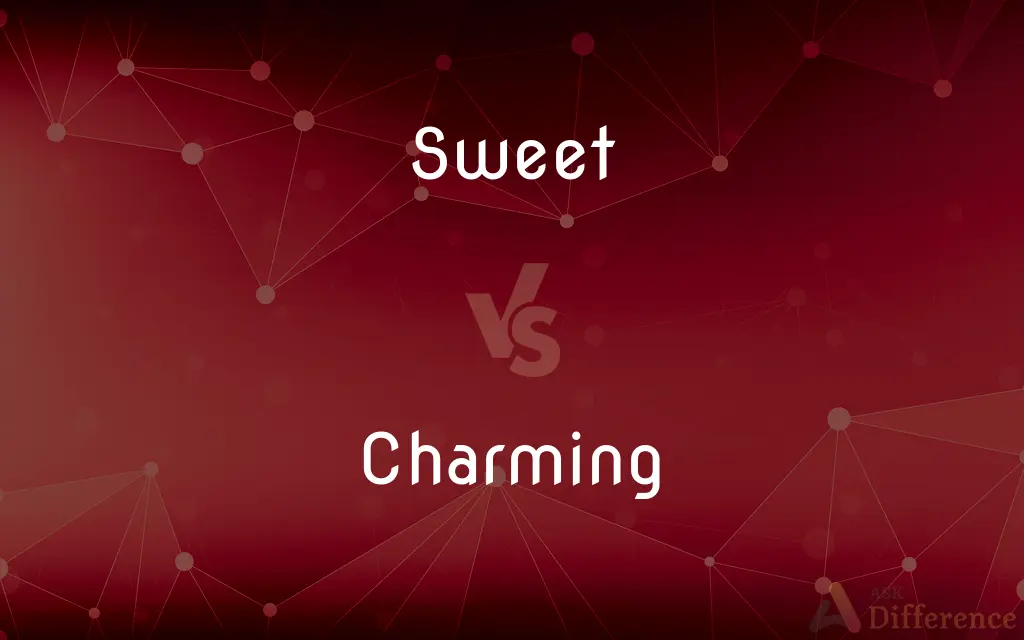Sweet vs. Charming — What's the Difference?
By Tayyaba Rehman & Fiza Rafique — Updated on April 29, 2024
Sweet generally describes a pleasant or endearing personality or taste, while charming refers to an alluring or attractive trait in behavior or appearance.

Difference Between Sweet and Charming
Table of Contents
ADVERTISEMENT
Key Differences
Sweet often connotes innocence and gentleness in personality or a sugary flavor in food, while charming implies a compelling attractiveness or elegance that can influence others.
Sweet behaviors are usually seen as kind and comforting, often invoking a sense of warmth and affection, whereas charming behaviors are persuasive, often used to win favor or admiration.
Sweet is straightforward, typically associated with genuine, heartfelt emotions or tastes, while charming might suggest a degree of sophistication or calculated finesse.
Sweetness in someone's demeanor is universally perceived as positive and non-threatening; on the other hand, charm can sometimes be perceived as manipulative or cunning if viewed skeptically.
In terms of appeal, sweet is more about simplicity and purity, which is easy to appreciate, while charm involves a more complex interaction of charisma, confidence, and sometimes manipulation.
ADVERTISEMENT
Comparison Chart
Primary Connotation
Innocence and gentleness in personality; sugary taste in food
Attractiveness and elegance in behavior
Common Usage
Describing temperament and flavors
Describing someone’s ability to attract or persuade others
Emotional Response
Comfort and warmth
Admiration and interest
Perception
Non-threatening, genuine
Can be sophisticated or manipulative
Complexity
Straightforward and simple
Involves charisma and calculated interactions
Compare with Definitions
Sweet
Refers to a kind, thoughtful personality.
Her sweet nature makes everyone feel at ease.
Charming
Often implies strategic social skills.
Her charming demeanor made her popular at work.
Sweet
Describes something that tastes like sugar or honey.
The cake was delightfully sweet.
Charming
Describes a delightful or pleasing attribute.
He has a charming smile.
Sweet
Used to describe endearing actions.
His sweet gesture of bringing flowers touched her.
Charming
Suggests a cunning ability to influence others.
He was charming in his dealings, always getting what he wanted.
Sweet
Indicates something pleasing to the senses.
She wore a sweet perfume.
Charming
Refers to the power of pleasing or attracting through personality.
Her charming conversation won the crowd.
Sweet
Conveys a sense of innocence.
The child’s sweet smile melted their hearts.
Charming
Indicates sophistication and grace.
The hotel was decorated in a charming Victorian style.
Sweet
Having the pleasant taste characteristic of sugar or honey; not salt, sour, or bitter
A cup of hot sweet tea
Charming
Very pleasant or attractive
A charming country cottage
Sweet
Pleasing in general; delightful
It was the sweet life he had always craved
Charming
Used as an ironic expression of displeasure or disapproval
‘I hate men.’ ‘Charming!’ he said
Sweet
(of a person or action) pleasant and kind or thoughtful
It was sweet of you to come
A very sweet nurse came along
Charming
Having the power or quality of pleasing or delighting
A charming cottage.
Sweet
Used for emphasis in various phrases and exclamations
What had happened? Sweet nothing
Charming
Fascinating or delightful; very likeable
A charming young man.
Sweet
A small shaped piece of confectionery made with sugar
A bag of sweets
Charming
Pleasant, charismatic.
Sweet
A sweet dish forming a course of a meal; a pudding or dessert.
Charming
Delightful in a playful way which avoids responsibility or seriousness, as if attracting through a magical charm.
Sweet
Used as an affectionate form of address
Hello, my sweet
Charming
Present participle of charm
Sweet
The sweet part or element of something
You have had the bitter, now comes the sweet
Charming
The casting of a magical charm.
Sweet
Having the taste of sugar or a substance containing or resembling sugar, as honey or saccharin.
Charming
Pleasing the mind or senses in a high degree; delighting; fascinating; attractive.
How charming is divine philosophy.
Sweet
Containing or derived from sugar.
Charming
Pleasing or delighting;
Endowed with charming manners
A charming little cottage
A charming personality
Sweet
Retaining some natural sugar; not dry
A sweet wine.
Charming
Possessing or using or characteristic of or appropriate to supernatural powers;
Charming incantations
Magic signs that protect against adverse influence
A magical spell
'tis now the very witching time of night
Wizard wands
Wizardly powers
Sweet
Pleasing to the senses; agreeable
The sweet song of the lark.
A sweet face.
Sweet
Pleasing to the mind or feelings; gratifying
Sweet revenge.
Sweet
Having a pleasing disposition; lovable
A sweet child.
Sweet
Kind; gracious
It was sweet of him to help out.
Sweet
Fragrant; perfumed
A sweet scent.
Sweet
Not saline or salted
Sweet water.
Sweet butter.
Sweet
Not spoiled, sour, or decaying; fresh
Sweet milk.
Sweet
Free of acid or acidity
Sweet soil.
Sweet
Low in sulfur content
Sweet fuel oil.
Sweet
(Music) Of, relating to, or being a form of jazz characterized by adherence to a melodic line and to a time signature.
Sweet
Remarkable; outstanding.
Sweet
Used as an intensive
Took his own sweet time to finish.
Earns a sweet million per year.
Sweet
In a sweet manner; sweetly.
Sweet
Sweet taste or quality; sweetness.
Sweet
Something sweet to the taste.
Sweet
Foods, such as candy, pastries, puddings, or preserves, that are high in sugar content.
Sweet
(Informal) Sweet potatoes
Candied sweets.
Sweet
A sweet dish, such as pudding, served as dessert.
Sweet
A sweetmeat or confection.
Sweet
A dear or beloved person.
Sweet
Something pleasing to the mind or feelings.
Sweet
Having a pleasant taste, especially one relating to the basic taste sensation induced by sugar.
A sweet apple
Sweet
Having a taste of sugar.
Sweet
(wine) Retaining a portion of sugar.
Sweet wines are better dessert wines.
Sweet
Not having a salty taste.
Sweet butter
Sweet
Having a pleasant smell.
A sweet scent
Sweet
Not decaying, fermented, rancid, sour, spoiled, or stale.
Sweet milk
Sweet
Having a pleasant sound.
A sweet tune
Sweet
Having a pleasing disposition.
A sweet child
You're so sweet!
Sweet
Having a helpful disposition.
It was sweet of him to help out.
Sweet
(mineralogy) Free from excessive unwanted substances like acid or sulphur.
Sweet gas
Sweet soil
Sweet crude oil
Sweet
(informal) Very pleasing; agreeable.
The new Lexus was a sweet birthday gift.
Sweet
(slang) Doing well; in a good or happy position.
Sweet
Romantically fixated; enamored with; fond of.
The attraction was mutual and instant; they were sweet on one another from first sight.
Sweet
; not salt or brackish.
Sweet water
Sweet
To the eye; beautiful; mild and attractive; fair.
A sweet face
A sweet colour or complexion
Sweet
An intensifier.
Sweet
Used as a positive response to good news or information.
They're making a sequel? Ah, sweet!
Sweet
In a sweet manner.
Sweet
(uncountable) The basic taste sensation induced by sugar.
Sweet
A confection made from sugar, or high in sugar content; a candy.
Sweet
A food eaten for dessert.
Can we see the sweet menu, please?
Sweet
Synonym of sweetheart, a term of affection.
Good evening, my sweet.
Sweet
(obsolete) That which is sweet or pleasant in odour; a perfume.
Sweet
(obsolete) Sweetness, delight; something pleasant to the mind or senses.
Sweet
To sweeten.
Sweet
Having an agreeable taste or flavor such as that of sugar; saccharine; - opposed to sour and bitter; as, a sweet beverage; sweet fruits; sweet oranges.
Sweet
Pleasing to the smell; fragrant; redolent; balmy; as, a sweet rose; sweet odor; sweet incense.
The breath of these flowers is sweet to me.
Sweet
Pleasing to the ear; soft; melodious; harmonious; as, the sweet notes of a flute or an organ; sweet music; a sweet voice; a sweet singer.
To make his English sweet upon his tongue.
A voice sweet, tremulous, but powerful.
Sweet
Pleasing to the eye; beautiful; mild and attractive; fair; as, a sweet face; a sweet color or complexion.
Sweet interchangeOf hill and valley, rivers, woods, and plains.
Sweet
Fresh; not salt or brackish; as, sweet water.
Sweet
Not changed from a sound or wholesome state. Specifically: (a) Not sour; as, sweet milk or bread. (b) Not state; not putrescent or putrid; not rancid; as, sweet butter; sweet meat or fish.
Sweet
Plaesing to the mind; mild; gentle; calm; amiable; winning; presuasive; as, sweet manners.
Canst thou bind the sweet influence of Pleiades?
Mildness and sweet reasonableness is the one established rule of Christian working.
Sweet
That which is sweet to the taste; - used chiefly in the plural.
Sweet
That which is sweet or pleasant in odor; a perfume.
Sweet
That which is pleasing or grateful to the mind; as, the sweets of domestic life.
A little bitter mingled in our cup leaves no relish of the sweet.
Sweet
One who is dear to another; a darling; - a term of endearment.
Sweet
Sweetly.
Sweet
To sweeten.
Sweet
English phonetician; one of the founders of modern phonetics (1845-1912)
Sweet
A dish served as the last course of a meal
Sweet
A food rich in sugar
Sweet
The taste experience when sugar dissolves in the mouth
Sweet
The property of containing sugar
Sweet
Having a pleasant taste (as of sugar)
Sweet
Having a sweet nature befitting an angel or cherub;
An angelic smile
A cherubic face
Looking so seraphic when he slept
A sweet disposition
Sweet
Pleasing to the ear;
The dulcet tones of the cello
Sweet
One of the four basic taste sensations; very pleasant; like the taste of sugar or honey
Sweet
Pleasing to the senses;
The sweet song of the lark
The sweet face of a child
Sweet
Pleasing to the mind or feeling;
Sweet revenge
Sweet
Having a natural fragrance;
Odoriferous spices
The odorous air of the orchard
The perfumed air of June
Scented flowers
Sweet
(used of wines) having a sweet taste
Sweet
Not soured or preserved;
Sweet milk
Sweet
With sweetening added
Sweet
Not having a salty taste;
Sweet water
Sweet
In an affectionate or loving manner (`sweet' is sometimes a poetic or informal variant of `sweetly');
Susan Hayward plays the wife sharply and sweetly
How sweet the moonlight sleeps upon this bank
Talking sweet to each other
Common Curiosities
What does it mean when someone is described as sweet?
It usually means they are kind-hearted and gentle.
Is being sweet always a positive trait?
Yes, it typically conveys positivity and warmth.
How can a person be charming?
By possessing an attractive and engaging personality that influences others positively.
Can charm be perceived negatively?
Yes, if it seems manipulative or insincere.
Which is more influential, sweetness or charm?
Charm tends to be more influential in social and professional settings.
Can foods be charming?
Not typically; charming is used more to describe personalities or styles.
How can sweetness or charm impact relationships?
Sweetness often fosters deep, genuine connections, while charm can quickly establish and maintain broader social networks.
Can someone be both sweet and charming?
Yes, someone can exhibit both traits, combining gentleness with an engaging presence.
How are sweetness and charm similar?
Both are generally seen as appealing traits in personality.
How are sweetness and charm different?
Sweetness is more about simplicity and genuineness, while charm involves sophistication and sometimes cunning.
What type of behavior is associated with charm?
Behaviors that are persuasive, engaging, and often strategic.
How does one cultivate charm?
Through developing interpersonal skills, charisma, and understanding social cues.
Which trait is more likely to win people over quickly?
Charm, due to its dynamic and persuasive nature.
Is sweet or charming better for leadership?
Charming, as it involves strategic influence and charisma.
Share Your Discovery

Previous Comparison
Fiction vs. Nonfiction
Next Comparison
Foreword vs. ForwardAuthor Spotlight
Written by
Tayyaba RehmanTayyaba Rehman is a distinguished writer, currently serving as a primary contributor to askdifference.com. As a researcher in semantics and etymology, Tayyaba's passion for the complexity of languages and their distinctions has found a perfect home on the platform. Tayyaba delves into the intricacies of language, distinguishing between commonly confused words and phrases, thereby providing clarity for readers worldwide.
Co-written by
Fiza RafiqueFiza Rafique is a skilled content writer at AskDifference.com, where she meticulously refines and enhances written pieces. Drawing from her vast editorial expertise, Fiza ensures clarity, accuracy, and precision in every article. Passionate about language, she continually seeks to elevate the quality of content for readers worldwide.
















































